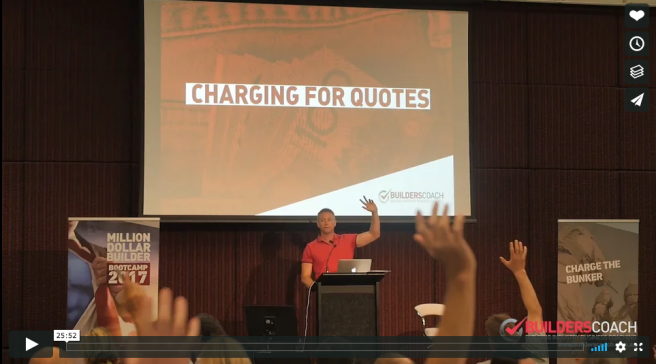
If you are already charging for quotes, then there’s no need to read any further – you’ve got the right idea.
If not, read on – there’s money to be made in charging correctly.
The short answer is yes, you should be charging for quotes, especially if you do itemized quotes or D&C. However, it’s much more than just dreaming up a number and slapping it on every inquiry that comes your way.
The first step is to ensure a strong marketing strategy. Your marketing should position you as the expert, the ‘go to’ person in your chosen niche or specialty. Once you have this positioning securely in place, you can plug your sales process into the back end. With sales being the biggest area of inefficiency in this industry (i.e. lots of quotes for too few contracts signed) the number one purpose for your sales process should be to qualify your prospective clients. Handling your inquiries correctly protects your time and lets your potential client know how you do business. Handling them the wrong way gives them the opportunity to waste your time.
So here’s a scenario where, even if you don’t intend to charge for quotes, you definitely should be. It’s important to bear in mind that the aim of the game here is to qualify the prospective client.
Let’s say you get a call for a renovation, first floor addition and bathroom. You show up at the appointed time to speak with the potential client about their proposed job. At some point in the conversation, the client makes the following statement: “I want a complete itemization of your proposal and when it’s ready, you can just send it to me by email or snail mail.”
How do you respond? If you’ve been in business a long time, you’ve had this happen. It’s critical to know how to respond to a super-controlling prospective client. Here’s a response that keeps you in charge of the situation but also allows the client’s ego to remain intact.
The sooner you let the potential client know how you conduct business, the better. In fact, this should happen during the pre-sales process when you send them your profile and clearly outline your process for doing business with them.
You start that part of the conversation with “Client A, itemization of any kind takes a lot of extra work and I’m happy to do it, as long as I’m paid for that service. We charge $65 an hour with a minimum of 4 hours for any itemization we do. Would this be agreeable?”
Their response will tell you if they are interested in a win-win business relationship or if they are going to be a classic P.I.T.A!
Now, if they start asking about your margins, then you know it’s time to walk. No need to get involved. Do they ask their doctor, attorney or dentist for an itemization? Do they tell their doctor what price they will pay? How about the manager or check-out person at the grocery store? Why do they think they are entitled to that information from you? You can try to explain if you wish, but there’s a high chance you are dealing with a potential client whose single focus is getting the lowest possible price for their work. Let another builder or contractor do the job – you don’t need it.
As far as sending a quote by email, snail mail or fax, that works for order takers. Order-taking requires the lowest price and that’s not where you want to be, especially as an expert in your field. If you don’t want the work, email your quote. If you want their business, inform them that when you go to the time and effort of compiling a quote, you want to sit down with them to review the proposal and ask/answer any questions they might have. If they aren’t willing to do that, they don’t want to make a decision and will try everything they can to avoid it. Politely tell them that you have their information and when they are ready to review their job with you and make a decision, you will be glad to come back and go over the job details and your quote for their work. You will unmask the real clients very quickly with this approach.
While it may initially sound ballsy or rude, this procedure sets the standard under which you are willing to work. Remember if you don’t set it, the prospective client will. The client is either at the mercy of your process for selling or you’re at the mercy for their process for buying. It’s your time to do with as you will, but why let some inconsiderate knucklehead waste your time? As a business owner and leader in your community, you must learn to guard your time as you would your life and insist that others respect your time. That way, you can focus on the clients you can do business with, not the clients who want to waste your time.
Woody Allen famously remarked that 50 per cent of success was showing up. Too many people stop there, and get 50% of what they could. If they showed up as a real pro – alert, prepared, practiced and primed in every way to deliver an extraordinary performance – they could achieve extraordinary results. In fact, following a well-defined sales process and professionalizing yourself and everyone in your business might just be the best way.











